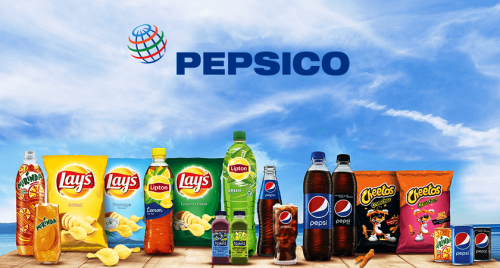
PepsiCo is one of the largest food and beverage companies in the world, with a portfolio of iconic brands including Pepsi, Frito-Lay, Gatorade, Tropicana, and Quaker Oats. Founded in 1965 through the merger of Pepsi-Cola and Frito-Lay, the company has grown into a global powerhouse with a presence in more than 200 countries.
The history of PepsiCo dates back to the late 19th century when a pharmacist named Caleb Bradham invented a new carbonated soft drink in his drugstore in New Bern, North Carolina. The drink, called "Brad's Drink," was made from a combination of sugar, water, caramel, lemon oil, nutmeg, and other natural ingredients. In 1898, Bradham renamed the drink "Pepsi-Cola," derived from the word "dyspepsia" (indigestion) and the kola nut, an ingredient used in the drink.
Pepsi-Cola quickly gained popularity in the United States, and by the early 1900s, the company had established bottling plants in several cities across the country. However, like many companies of the time, Pepsi-Cola struggled during the Great Depression, and in 1931, the company went bankrupt. The brand was sold to a candy manufacturer named Loft, Inc., and the new owners worked to revitalize the brand.
Under Loft's ownership, Pepsi-Cola began to focus on marketing, using slogans such as "Twice as Much for a Nickel" to emphasize the value of its product. The company also introduced its iconic red, white, and blue logo, which is still in use today.
In 1965, Pepsi-Cola merged with Frito-Lay, a snack food company, to form PepsiCo. The merger was intended to create a more diversified company with a broader portfolio of products. Over the years, PepsiCo has continued to expand its product offerings, acquiring brands such as Quaker Oats, Tropicana, and Gatorade.
Today, PepsiCo is a global company with a presence in more than 200 countries. Its portfolio of products includes not only soft drinks and snack foods but also juices, sports drinks, and breakfast cereals. The company is known for its commitment to sustainability and social responsibility, with goals to reduce greenhouse gas emissions, conserve water, and promote diversity and inclusion within its workforce.
PepsiCo's success is due in large part to its ability to innovate and adapt to changing consumer preferences. In recent years, the company has invested heavily in research and development to create new products and improve existing ones. For example, in response to growing demand for healthier snacks, PepsiCo has introduced a range of products under its "Better For You" portfolio, including Baked Lays, Smartfood popcorn, and Tostitos Cantina chips.
PepsiCo is a multinational food and beverage corporation that operates in more than 200 countries worldwide. The company's product portfolio includes a range of well-known brands, such as Pepsi, Frito-Lay, Gatorade, Tropicana, Quaker Oats, and many others. PepsiCo's business can be divided into three main segments:
-
Frito-Lay North America: This segment includes PepsiCo's snack food brands, such as Lay's, Doritos, Cheetos, Tostitos, and others. It is the largest segment of the company, accounting for over 40% of PepsiCo's net revenue.
-
PepsiCo Beverages North America: This segment includes PepsiCo's beverage brands, such as Pepsi, Mountain Dew, Gatorade, Tropicana, and others. It is the second-largest segment of the company, accounting for approximately 30% of net revenue.
-
Quaker Foods North America: This segment includes PepsiCo's cereal and snack brands, such as Quaker Oats, Cap'n Crunch, Rice-A-Roni, and others. It accounts for approximately 5% of net revenue.
In addition to these segments, PepsiCo also has a presence in other regions, including Europe, Latin America, Asia, the Middle East, and Africa. The company operates through a network of bottlers, distributors, and retailers, and its products are sold through a variety of channels, including grocery stores, convenience stores, restaurants, and vending machines.
PepsiCo has a strong focus on innovation and product development, continually introducing new products to meet changing consumer preferences. In recent years, the company has also made significant investments in sustainability, setting ambitious goals to reduce its environmental impact and increase the use of recycled materials in its packaging. Additionally, PepsiCo has been recognized for its efforts to promote diversity and inclusion within its workforce and the communities where it operates.
PepsiCo has also been a leader in sustainability, committing to reduce its greenhouse gas emissions and water usage, as well as increase the amount of recycled content in its packaging. The company has set ambitious goals for itself, such as achieving net-zero emissions by 2040 and using 100% renewable electricity to power its operations by 2030.
In addition to its focus on sustainability, PepsiCo has also been a champion of diversity and inclusion. The company has been recognized for its efforts to promote gender and racial equality, both within its own workforce and in the communities where it operates. For example, PepsiCo has launched initiatives to promote women's leadership and entrepreneurship, as well as support programs for underrepresented minorities in STEM fields.
Overall, PepsiCo's success can be attributed to its ability to stay ahead of trends and anticipate the changing needs of consumers. With a strong focus on innovation, sustainability, and diversity, the company is well-positioned to continue its growth and success in the years to come.








